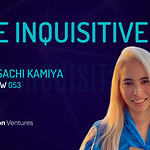Welcome to The Inquisitive VC. Today I am speaking to Boris Revsin, the Managing Director of Tribe Capital.
We speak about his journey to crypto, how Tribe invests, crypto cycles and narratives, airdrops and more! I hope you enjoy this episode.
Nawaz Ahmed: Thanks for joining me, Boris. I'm looking forward to this interview. Yes. Thank you. Appreciate you having me. Of course. So I'd like to start with understanding your journey, the start of your career from, you know, when you started to get into crypto, to your current role as the managing director at Tribe.
Boris Revsin: Yeah, of course. Let's see. So I was five years old when my family moved from Russia. Both my parents were engineers so I started coding super early. I was never that good at it. But my dad kept hammering away so I went to school in Amherst, Massachusetts, for computer science. But quickly realized that I was getting lapped by the kids at school that had a pretty good curriculum. And so I had to figure out a way to, like, stay in the game.
What I figured out essentially was that people were building web applications at this time. This is like 2006-2007, and it was really greenfield You could build really simple things really quickly and you could get it out to the market, and there just wasn't a lot of competition. And so I started building tools, some that I can't really talk about on a podcast, but just like goofy college kid stuff until I ran into my first co-founder, Jared.
And what we built was essentially this thing called Campus Live, which was a home page for college students. Very outdated these days. But the idea is basically you pull in like all food delivery, all classes, the Facebook API for those that remember, you could like basically poke someone through a third party app that was funny, but pretty much in two weeks all the kids made it their homepage. We ended up expanding to like 100 different schools, went pretty viral. And I remember someone offered Jared and I like a million bucks just to buy it, and I said, No way, we're going to raise venture capital. This is like the day like everyone's looking up to Facebook in the crazy story. So we ended up raising money.
And by the end, this is an eight-year journey. By the end, we would have probably made more money after giving up, I think more than 50% of the company to VCs by just selling the thing for a million or two. So very funny. Kind of full circle of eight years could have been working at like Microsoft and probably done better, but it was a good learning experience. It was like my real college. And so after that, we sold the company and had a little bit of an earnout, I started another company again with Jared and a bunch of other folks’ company now called HQO. It was called Venture Up. I was the founding president and between 2015 and 17 I ran sales marketing, go-to market for this company, which was in the prop-tech space towards kind of like early 2017.
I had started accumulating crypto personally. This was before that big gold rush that happened where everything went to like those local all-time highs went on all the forums and so forth and just got really into it and started paying more and more attention to what was happening in that space. And I've always had an interest in game theory and computer science and business. Cryptos, those three things put together.
So in the middle of 2017, I went to the co-founders. I was like, This is not going to work. I love doing this. And I'm just in your way doing this other thing. By the way, that company with me doing nothing more after I left in 2017 has gone on to be really successful multiple, multiple, hundreds of millions in market cap like they've done really well. And that's in spite of me being there, not because of me being there,
But I actually went and started working in crypto with a friend named Julian, who was also a founder in Boston, and we started this thing called Game Theory Group, and this was like the day of ICOs. Sure, a lot of people listening to this can remember this. And we, you know, we had some money, but nothing crazy. And so we do some of these initial coin offerings, honestly, as a way to figure out what the hell is wrong with them because I knew day one like this cannot be the way that these protocols launched because almost all of them were unfair launches. Almost all of them were pre-mined.
Obviously, all of them were essentially on Ethereum, but it was an interesting learning experience. And so at the same time, we started a blog called Game Theory Group, where we'd send our friends our thoughts on crypto, and we usually did it tongue in cheek and that became moderately popular. Maybe a few thousand people read it. I've since taken it offline because some takes were spot on, some I'm just like, Can't believe I wrote that.
But the point is we went really deep down the rabbit hole and then together in late 2018, we joined basically we're acqui-hired by this group called Republic, which many folks listeners probably heard about. And Republic at the time had a big crowdfund presence and had spun out of Angelist and they wanted to launch a venture group, which is what we did for them. We essentially launched the RIA, which could take in qualified clients, put them into SPVs or funds, and then at the same time my friend Andrew Durgee and some of his sort of co-founders launched Republic Crypto, which is pretty well known today as sort of a consulting group, economics group that helps stand up protocols. So that was sort of my first major formal foray into crypto.
And at Republic Capital, which is what it ended up being called, we ended up deploying hundreds of millions across protocols, north of 100 crypto investments alongside non-crypto investments, grew the team from the two of us to 23, and I was there until mid 2022. So that was kind of the origin story.
Nawaz: Yeah, very interesting. It was great to hear the founder background and then kind of reconnecting with your studies and coming back into crypto right on the CS side. I've heard of Republic, I'm sure others have as well. More recently, I think over the past few years, you joined Tribe. So tell me about that move and I guess a little bit more about what Tribe does. I understand they're a generalist tech fund, but they're doing a lot more in crypto? I would also like to understand the crypto thesis that Tribe has.
Boris: Yeah, sure. So, you know, doing the work at Republic was definitely a crash course in all different parts of the crypto ecosystem all the way through from like centralized entities and exchanges all the way through to like the most degen protocols you can imagine. The smallest check we wrote was $50K The biggest I think we wrote was $40 million. So we went across the gamut
When I was sort of wrapping up my time at Republic Capital, I was thinking about the venture industry more broadly, like, What did I want to do next? And one of the challenges that I saw in Venture was that most funds were still doing the things they were doing ten or 20 years ago, which is like worse. You'll hear pattern matching, gut feel like a lot of it was the art and the science was just kind of catching up. And there were plenty of fantastic people. I mean, there are any number of VCs that are repeatedly really, really good, and I think a lot of them have an intuition for founders, and so they're good at Seed, maybe even getting into Series A, But once these companies start getting a lot of data, like a lot of revenue and call it like in the millions of revenue, many millions or a ton of users, it starts to become more challenging how you break apart their data.
And when I did the landscape of what venture firms were out there, one of the ones that I had already been very familiar with because we were LPs from Republic is Tribe and Tribe really is what we call a quantitative investment firm. We take data very seriously. It's the core of almost everything that we do, macro and micro.
The team is comprised of engineering and data science to a large extent, and it's really seen as the North Star for how we make investment decisions, but not the only way. And I really feel that the entire world is sort of pivoting Open AI and all the other AI LLMs have sort of opened the door to people, regular people sort of understanding.
How important this collection of data is to then make decisions. That's how the AIs make decisions, right? Unique datasets. They synthesize them and then through various methodologies can actually kind of figure out what to say next in a way, that's kind of what Tribe has been doing for a long time without necessarily the big large language models that we are starting to incorporate.
And so I did feel like data and insights from that data is going to push the venture industry forward, and that's what I wanted to do. So I joined Tribe in 2022 initially to team up with the crypto group and help lead that. Our crypto funds about $100 million. We now have a second fund, but the first fund that I joined is just under $100m. We were somewhat deployed so we had an awesome portfolio and my job really was to synthesize what we already had and build on it and create the thesis for, you know, last year, this year, and so forth. So that's what happened at Tribe.
The core of our thinking at Tribe Crypto is this, we want to be early in the process of these decentralized protocols. So we focus almost exclusively on the crypto side, on decentralized or called decentralizing protocols because they rarely start decentralized for any number of reasons we can talk about. And the idea is we want to be early, so call it seed and then we want to continue to participate into the series A's or the private rounds and beyond.
And the way that we do that is by synthesizing the data. We eat a ton of on-chain data using Flipside Crypto, Quick Node, a bunch of other platforms. We built our own framework and we synthesize that data and we create this 50-page report.
But basically the idea is we eat up all this data. We're already investors, and this is what informs us whether or not we should buy, sell, hold, support, introduce whatever. And that data component is really important. Not always that the investing side because some of these protocols will be beat before testnet, but very much through testnet, mainnet, full launch and the data in terms of usage and revenue and fees that happen after the fact.
And so our focus is on those protocols and we really are focusing on the protocols that can generate meaningful fees. Right now we believe a lot of that sits in the infrastructure middle layer and on the consumer front, call it like front ends. We have made those investments, but we really do feel like in order for us to get comfortable, we need to get comfortable with the regulatory aspect of a front end that plugs into a global user base. And I think some of those questions are still unanswered.
Nawaz: Very interesting. You're focusing on projects that are going down the path of decentralization. How do you think about investing in equity versus tokens then?
Boris: Yeah, I'll answer a question you didn't ask first and then I'm going to get to that one here. So maybe with Bitcoin or Ethereum or a very small number of what we'll call fair ish kind of fair launches, there were some that I think you could claim were attempt to be a decentralized protocol right away was because crypto was just not that popular and there weren't as many people trying to sybil, game theory or just straight up hack your network.
And so it could go through this period of like, Hey, we're sort of decentralized, sort of not, but like we want to be decentralized right away. Let the community run it. Like the community. Crypto has a mercenary angle, too. And so without the proper things in place, it's really hard to just do it in theory and like release.
That's my take. And so what we typically advise founders is, yes, you want to get to what we would call properly decentralized, which is different for every type of sector, right? Different from an L0, a base chain, a layer two or a game. Right. Like very different needs for decentralization and trust.
So it's going to take much more time these days. You have to be much more resistant to the outside forces. That's one. In terms of investing in equity, in tokens. My belief and we wrote a research paper on this, is that most of the value in things that need to eventually be decentralized will be in the token as the unit of account like it is ultimately what people will be able to own, what people will want to own. And if the protocol is properly designed in some measure, whether through validators or nodes or maybe in some regions direct distributions to tokens, that's where the value will accrue. Now, the problem is we're nowhere near there yet, right? Like even decentralized protocols have a centralized treasury. Right. where often many of the fees will accrue, especially true for exchanges and perps protocols that are ostensibly on chain, but only give up some of their fees through, you know, like GLP or whatever.
You're talking about some of the perps platform. So we're not there yet. But I think that the ultimate goal ought to be that the holders of the token can, if they choose, benefit from inflation or fees. And that's where the industry is clearly going with what you're seeing with Ethereum and everything else. So that's my take of where the value is, where we actually write checks. Yeah, most of them have an equity component that over time means less and less.
Nawaz: Okay. Definitely makes sense and interested to hear your opinion on the value of airdrops?
Boris: So look, it depends on what you're going for. Airdrops are a very easy way to grow your social media account, grow your discord, get people to get or want the token. There are pretty bad way for people to hold it. Retention rates are extremely bad with some very rare exceptions. And part of it is because a lot of projects don't think about the post airdrop marketing nearly as much as they should.
You know, this time is different type of thing. And then the other part of it is like, look, it's a bunch of people that want to make some money. I mean, you can't imagine 60,000 people in a period of two weeks all of a sudden care about you so much. So from a marketing perspective, like a shock marketing thing, I think it's fantastic from retention and usage, I think it's very much up in the air.
There are some solutions. So one of the companies that I'm a board member on an observer on is Flipside Crypto, an investment we made up both Republic and Tribe, and what they offer is this opportunity to earn tokens through an airdrop like situation, but you earn the tokens through doing these things they call challenges, which means if you're an engineer you do some engineering solutions, data science, like you learn about it, you get interested in it, you understand why it's important you create something.
And I think people want to create something and they feel more attached to it. And you can see just in the numbers that Flipside shows is if you do it that way, you get a lot more retention by I think it's an order of magnitude. That's where I think airdrops need to go. They need to become more creative, more long-term.
The hard part is that in a bull market, airdrops tend to really help the launch of a token, and so people will keep doing them. It's a distribution mechanism and it's to build your future distribution arm. You just really people really need to think about the post airdrop component, and I hope we have various different iterations of this, even this cycle, because I think if we don't, you're going to see pretty big sell offs in these new tokens pretty quickly.
Nawaz: Yeah. Now that that makes a lot of sense. I think Flipside is probably similar to a company that I was a small angel in called Layer3 where you essentially do a bunch of activities and you get rewarded token I think that that's a way better way of doing, you know, incentivized rewards, which I think is quite cool.
There's a lot of conversation and excitement around an upcoming bull market. You know, a lot of people asking me what is the potential narrative for this coming bull run and I'm interested to hear what your opinion on that is.
Boris: I was talking to a very smart investor friend of mine yesterday and what he said really echoed with me, which is we have to move away from narratives because narrative-driven bull runs go up big and down big and really have very little staying power.
And so I hope we move to products and fees and revenue. So if you can ask me for my narrative, it would be generate fees, generate revenue and make people want to pay them. That is the only narrative that will give Crypto's staying power. So I'm okay with the speculative premium's like, I get it. You don't know how big something can become.
Retail has access, retail wants to participate. All of that is fine. I'm not commenting on valuations. What I am commenting on is these protocols must find a way to deliver value to either token holders or a centralized entity, whatever it is that they've structured. And I can't think of a better value driver than someone being willing to pay for your product.
That's it. And so when I look at protocols more broadly, even the major base chains like Ethereum generate meaningful revenue, right? Solana does too, But it's inexpensive. It kind of is its own Achilles heel, right? But then all these other L2s and L1s, I think just getting cheaper and cheaper and faster and faster and leaving a ton of empty blocks, It's just like it's really diminishing returns.
We really have to go back to what do people need or what do we think they will need and will people pay for? And that to me has to be the narrative for the cycle. We're not there yet. It's not the narrative right now. Right now the narrative, I don't know. It shifts every few weeks. Modularity, right? And we believe in that. Like I get it. We're big investors in Eclipse, we're big investors of a bunch of other modular plays. And I think modularity is a way to drive revenue to multiple streams and accrue value. So it's super interesting to me, but these things are going to change over time.
Nawaz: Yeah, I think I think that's an interesting point. And going into where you're seeing value for your investment in Tribe investing over the next year. You mentioned modularity are there other areas that you're looking at when it comes to investing?
Boris: Yes, I'll make it really easy if a founder ends up listening to this and we tend to invest in places that can be or in protocols that can become the hub for other people to build on top of. And I think the reason that we do that is we recognize that a protocol that's fully on-chain, fully decentralized, qat the end of the day, it's only as valuable as people that leverage it to generate some sort of fee and or pay a fee back to it. And so to me, it's building one application front end. You've seen this time and time again. People use it for a while, they get excited, but then for whatever reason they move on to the next thing.
To keep people coming back, you need to build a feedback loop that says, I used your tool it had great documentation, good structure, very stable, and we're going to build on it, and then the next person will build on it and the next person will build on it and is going to continue to accrue value. And so it's very important for us for you to either have a developer marketing plan or for you to be intrinsically built for devs.
It's okay if you also have built your own star product. So like let's say you're building a L1 and you built your own exchange, that's fine. I mean, it makes sense. You're eating your own dogfood, but at the end of the day you have to be able to attract developers and there's only so many protocols that are going to be able to do that because they're all sort of fighting for the same group.
So the other part of it is if you can attract new developer teams, either you're abstracting away the crypto element or you're abstracting away something else that brings non-web3 or crypto devs into the ecosystem. That's really interesting to us.
The other component is at least now we're looking for people that understand two things the game that's being played now, which has a lot to do with your you're sort of like V3 crypto ecosystem, right? Devs, market makers, exchanges, whatever. They understand where value sits and how to get it in the now and then we are looking founders that can look around the corner and basically say like, is this really how it's going to be the whole time? This sort of pre-baked marketplace? I don't think so. The smartest founders don't think so, and they're trying to look around the corner to be like, what will be the pillars of the ecosystem in 25, 26, 27?
I'm telling you, it's not going to look like this for regulatory reasons, for liquidity reasons, for regional reasons. There's going to be like lots of change and people that can paint us a picture of what the world will look like in 18, 24, 36 months. That to me is most interesting. And you hear all kinds of different visions, which is why I'm doing this in the first place.
Nawaz: Yeah, okay. No, that's a that's a good point. And stepping a little bit back to, you know, Tribe more generally, Tribe does some interesting things, like incubation and launching products like Termina. Interested to hear what the thinking around that is for a venture fund.
Boris: In many ways, Tribe is a data company with a venture product, not a venture product with a data arm. So like, when we think about what we're good at, we're good at collecting data. We know how to do that both from private and public sources, the techniques, the people, the relationships, the automation, all of that. So like we can get a lot of data and we've built internal algorithms and frameworks and actual software to be able to analyze them quickly faster than anyone else. And I'm talking both onchain and off chain data.
So we're a product shop we can build stuff. We've incubated many things in the past. Termina For those who don't know, is our data product. It's the one that can eat in private data, synthesize it, benchmark it against every other company or protocol that we've ever looked at, and within a day or so create a 60 page report across any metric you can think about, just like LTV, CAC, cohort analysis, revenue saturation, everything, mapped against everything else.
The advantage that gives an investor is basically you can see how well this company is doing, not just in and of itself, but compared to its peers in various sectors and stages. And so we felt two things. One is we need data that not just Tribe is collecting, like we want data in aggregate form from other people in the ecosystem. And two, we felt that with the advent of some of these A.I. tools that made things a lot cheaper, a lot of other people would see what we're doing and basically want to catch up. They would want to build their own tools. And so by spinning out Termina as an incubation, we achieve two things. One is we're able to hire the best engineers that work for equity and not to work for carry or salary, but they want the dream and two we are able to plug in if our customers in Termina agree to data sources from them and they can get data sources from us.
And that combination of both data sharing, it's again, it's often and the ability to hire the best people is why we spun out Termina in the first place. So now we just last four months we've run more of these eight balls. These are the data analysis than we ever have before. They're way higher quality and we're hiring the best people. So it has achieved what we wanted it to achieve. And we recognize it's unique for a fund to take its special sauce and basically open it up to the world. We feel like it'll raise the bar for everyone, but mostly it will make us the centre of the private data investing universe.
Nawaz: Gotcha. That makes sense. And I think, am I right to say Nibiru was an incubation as well? How did that play out?
Boris: Yeah, so Nibiru actually was a real learning experience. I actually started working on Nibiru at the same time as I joined Tribe. It was my first major project here. And, you know, I think a few lessons. One is we absolutely know what we're doing when it comes to incubation. We know how to connect the key stakeholders. We can help raise money, we can obviously deploy capital. I think the key learning is the engineers that we brought around the table at the beginning were amazing and we should have probably let them run without us even faster.
And so we really taken a lot of this feedback in and we've decided like this is what we're good at. We can surround an incubation with all of the go-to market and strategic and data support that we can. But the most important thing for an incubation for us is the engineering and product base. We can not recreate that. We don't intend to recreate that. And the goal is that we partner up with those folks and we can be supportive while also letting them do their thing. Because at the core, you know, the best founders are the ones that are product and engineering-led and they partner up with either co-founders or incubations like ours to drive forward their go-to-market.
So I expect Nibiru to be a huge success, partially in spite of us, partially because of us, and it's been a huge learning experience. And now we have a number of other not yet announced protocols in our incubator.
Nawaz: Very interesting. And so you mentioned, at Republic you were initially an investor in Tribe and I know you have some experience on the LP side, what is general advice that you would give to a new venture manager who's considering raising a fund in this coming market?
Boris: Sure. So I've been raising money in some form or another since I was 20. I'm 37 now, and started raising LP Capital in like 2017. So I'm not, you know, a full-on veteran. But I can tell you the state of affairs in the last few years, up until roughly the first quarter 2022, raising capital was pretty easy because interest rates were low.
Venture returns on paper especially were fantastic. There were a lot of IPOs, crypto was in a bull market. People really felt like they were going to give you money and make money. No problem. Someone always investing at a higher price. The world has changed and it's going to stay changed for some time in spite of this crypto bull market.
I think investors both in crypto funds and venture funds broadly right now, are now really doing the comparison worth of risk, reward and time value. So when you put money into a crypto fund or a venture fund, you know, three, four, five, seven, ten, 12, 14 years later you might be getting distributions. Okay, so who wants to make those kind of investments?
Well, institutions have to, but they might be overweight. Many pensions and endowments are overweight. And the way they basically get overweight, right, is if the private values don't go down and that's up to the manager, the managers to mark these things down. Right. So while publics do all of, go down, all of a sudden what you're seeing is they feel like they're really underweight public.
So they're picking that side up and the private side, all of a sudden they're overweight. Now, the public, the majors have gone up and privates have started come down. So now you have a little bit more room. And I think they're open to managers. However, if you're an emerging manager, like going to an endowment, going to a pension is really hard.
I mean, it's doable, no question. A lot of them have an emerging manager program, but the relationship is long. It takes like six months, 12 months, 18 months, continuous updates, continuous meetings, really hitting what they're looking for, a nail on the head for you to get into that program and then start to figure out, are you one of the seven or eight VCs they're going to pick?
And of those maybe six are platforms, they're going to stick with no matter what, if they can get in like a Sequoia or whatever. So now you have like one or two slots, right? What are the other options? Family offices, spooked. Once that got into crypto, many got burnt. They're coming back. It's a little scary for them. And then the ultra-high net worth, who can make a decision on a dime, but they tend to write six-figure checks. So everywhere you look there's a challenge. One has to realize the challenge is different. How to deal with an ultra-high net worth or maybe a single-family office. That's still the Principals making the decisions are different from how you deal with a CIO-based person who you know is not always paid to take maximum risk.
A lot of them are paid just like maintain the legacy and then institutions who have to deploy but have all the options in the world because everyone wants to pitch them. So you have to come up with a different game plan for each type of group, and you have to be really transparent, you have to have an absolute edge, you have to have an edge.
Ours is data, but that doesn't have to be your edge, it can be anything. And then see, you have to think about what you can do. In addition to just deploying capital. Is it a co-invest program? Are you going to bring them to the things that are important to them? It's different for everyone. What can you do to provide access to something in addition to overtime returns?
That's for emerging managers, right? Like you really have to showcase yourself to be different. And I would also say don't get discouraged. It's very rare with institutional or family offices. Your first meeting, you walk out with a check in 2024. It's just not going to happen. But I also feel like what you can see and this has happened to Tribe like you start getting a lot of no's and nos and nos and nos and you stay with them.
You keep updating them and all of a sudden they see something in your win loss flips. And now you know all of them, you know, people you've built relationships, you go back and you start winning all the deals and that's really when things start to kick off for you. So yeah, and I, you know, I myself am a LP in a number of managers and I think you got to use your network hardcore, ask them for referrals, ask them for references. People tend to trust people they work with for a long time. So here's my advice.
Nawaz: Yep. Now thank you for that. That's some great advice. And coming to the to the end of my questions. To start with, I'm keen to understand a secret obsession of yours that not many people know about?
Boris: A secret obsession that not many people know about.
Okay, so I have two little girls and so I don't have a lot of time after work, which also goes on for a long time at 9:30 p.m., two sometimes three days a week. I jump on Call of Duty with usually three other guys and get absolutely roasted by 11 year olds. And I have been doing this since COVID started. I have not improved at all. And you can tell from my like kill death ratio in Call of Duty, and yet I still do it two or three days a week. And I thought initially it was about the game. But I think it's a way to like connect and hang out with your friends. And I just, my wife told me that and I was like, That can't be it. That's not why I'm doing it. I'm doing it for the game. And she's like, You might be worse now than you were when you started. So that's why I love doing it. And I stay up quite late for that and get less sleep. But it's worth it. I love it. Love it.
Nawaz: And finally, what's your most recent publicly announced investment and why did you make it?
Boris: So? We've had a bunch of announcements just in the last few days. I'll just pick one out of the hat. Blueprint is building this protocol called Concrete. And essentially what they do is liquidation protection. You pay a little bit into a pool of LPs that generate fees from that. And then if you're getting close to being liquidated or margin called them a few different plantations, this thing can save you.
But the reason that I like it at a very macro level was that in the last cycle, deleveraging can happen very quickly, right? The Terra component, the FTX component and I feel like for both retail and institutional, the trading stack needs to be hardened and you need to have tools at your disposal for sophisticated and unsophisticated traders to protect you and stop the on chain primarily here deleveraging of assets because off chain it was mostly scams and frauds. On-chain it degraded fairly gracefully, right. Like it did what it was supposed to do. But my hope is what these guys can make it do things better and safer. And I think that's important to the longevity of both people's balance sheets and also the ecosystem in general. So check out concretexyz I think is the Twitter handle.
But we also just announced investments in Grass, which is built by Wind, in Lava, which is a modular play. In Analog. So we're we're pretty active.
Nawaz: Great. Those are interesting ones. I've seen the announcements. Thank you for joining Boris. I thought it was a very insightful conversation and great to hear your advice about new fund managers as well as your thoughts on crypto right now.
Boris: Well, yeah, thanks for having me. Really enjoyed it. I appreciate great questions.
Disclaimer: The Inquisitive VC is provided for informational and educational purposes only and is not intended to provide commercial, financial or legal advice. Nothing in this article and podcast constitutes an offer of securities or regulated financial products or financial services to any persons or a solicitation to buy or sell any tokens or securities or to make any financial decisions. Do not trade or invest in any project, tokens, or securities based upon this podcast episode. The host and guests may personally own tokens or be an investor in projects that are mentioned on the podcast.














Boris Revsin - Tribe Capital